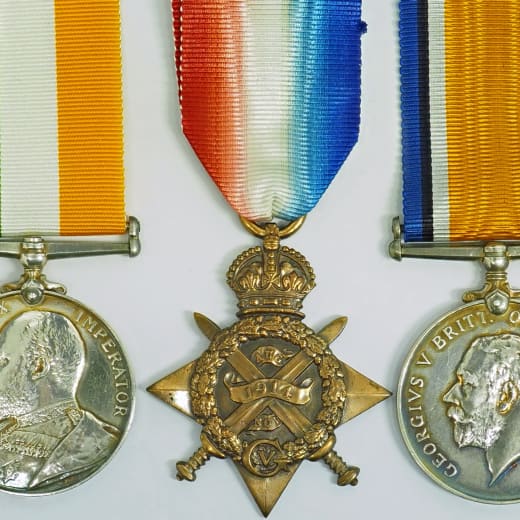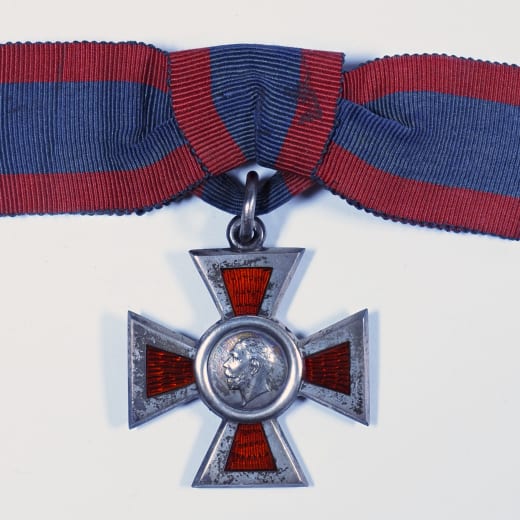
Jersey Heritage have acquired a new collection of medals at auction awarded to Jersey woman, Florence Puddicombe, for nursing services during the Boer War and the First World War.
Florence Catherine Puddicombe was born in St Aubin, Jersey on 10 December 1867 to Joseph Domett Puddicombe and Helen Frances (née Victor). By the 1881 census, Florence was living at Rouge Bouillon, St Helier with her mother, who is recorded as a widow. It is uncertain when her father, a sailor, died. By 1891, Florence was training as a nurse at St Bartholomew’s Hospital in London. Upon enrolling at the hospital, she gave her address as 13, Royal Crescent, St Helier.
Florence completed her nursing exams between 1891 and 1894, simultaneously working as a staff nurse during this time. In May 1895 she qualified and left St Bartholomew’s.
In March 1899 it was reported that Florence’s mother had died by suicide. The St Helier death register records her death as “consequences of poisoning by carbolic acid”. A year later, Florence signed up as a member of the Princess Christian’s Army Nursing Reserve, an organisation founded by Princess Christian, a daughter of Queen Victoria, to work alongside the Army Nursing Service. She sailed from England to South Africa in August 1900 to serve in the Boer War. This was the first major conflict that saw Britain deploy nurses in considerable numbers and laid the foundations for army nursing going forward. Florence served in South Africa for 2 years, during which time she worked at No.5 General Hospital, Wynberg, and No.15 Stationary Hospital, Heidelburg. The former was one of the largest general hospitals in operation at the time, offering 940 beds to sick and wounded servicemen. She returned to England in September 1902.
Over the next decade, Florence is recorded as working as a nurse in Felsted School in Essex. In August 1914 however, she enlisted as a Sister in Queen Alexandra’s Imperial Military Nursing Service Reserve. Her service record can be found in the National Archives.
Florence served for the entirety of the First World War, her service officially ending on 24 August 1919. She was initially posted to a General Hospital in Le Havre, and from there to Etretat, further up the French coast. She also worked in hospitals in Etaples and Wimereux.
Upon her return to England in 1919, Florence moved to Launceston, Cornwall where her cousin was living. Throughout the war, Florence had noted this cousin as her next of kin on official records. She remained in England for the rest of her life and died on 4 November 1943, age 76.
- Queen’s South Africa 1899-1902 – a campaign medal issued to all who served in the Second Boer War from 11 October 1899 to 31 May 1902;
- King’s South Africa 1901-02 – a campaign medal issued to all who served in the Second Boer War from 1 January 1902 and who completed 18 months service prior to 1 June 1902;
- The 1914 Star – a campaign medal awarded for service in France or Belgium between 5 August and 22 November 1914;
- British War Medal – a campaign medal awarded to all who served in the war over a prescribed period; and
- Victory Medal – awarded to all who served in the British armed forces between 1914 and 1918
Image 2
- Royal Red Cross, 2nd Class (A.R.R.C.) – an award for nurses who have shown exceptional devotion. and competence in the performing of nursing duties. This award was initially limited to women but from 1976 could also be awarded to men
Florence received the Royal Red Cross from King George V at Buckingham Palace on 11 December 1919.
Although Jersey Heritage have an extensive collection of war medals, very few of these were awarded to women. These are the first medals that we have in the collection awarded to a woman during the Boer War and also the first example in our collection of a Royal Red Cross.
We are extremely grateful to the members of our Acquisitions Fund who assisted with the purchase of these medals.






